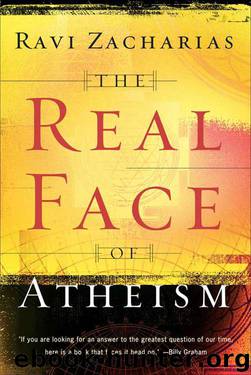The Real Face of Atheism by Ravi Zacharias

Author:Ravi Zacharias [Zacharias, Ravi]
Language: eng
Format: epub, mobi
Tags: Religion, Philosophy, Non-Fiction
ISBN: 9781441204257
Google: FBjPHWkJCQkC
Barnesnoble:
Goodreads: 17352662
Publisher: Baker Books
Published: 1990-01-01T00:00:00+00:00
Hope Abandoned
Having killed God, the atheist is left with no reason for being, no morality to espouse, no meaning to life, and no hope beyond the grave. Significantly, the absence of future hope has an amazing capacity to reach into the present and eat away at the structure of life, as termites would a giant wooden foundation. Hope is that indispensable element that makes the present so important. The athlete labors with the hope of victory. The researcher works diligently in the hope of a breakthrough. Every human endeavor has a hope, and if life itself has none, the application is foreshortened and the now is squandered away in the absence of any future gains.
There is a complete sense of alienation in the world one hundred years after Nietzsche. It is this utterly morbid and hopeless philosophy that has sent many of our youth into a search for other realities. Those who do not have hope, in an effort to drown their despair, turn to drugs or alcohol or other experiments that they think will break this stranglehold of futility. The farcical and the absurd are hallmarks of a trapped society, devoid of all hope. Why have our young people turned to drugs in such large numbers, and why are they opting for other states of consciousness? It is because of the unbearable emptiness they face with a philosophy of life that offers no hope and no answers.
After writing Brave New World, Aldous Huxley spent the latter years of his life seeking other realities in drugs. Huxley is the one who, in his book Island, had his hero say, “What a comfort to be in a place where the Fall [of man] is an exploded doctrine.” After wrenching the past from the hands of a divine Creator, we barter away the present, convinced that there is nothing to hope for in the future. The eclectic composer John Cage recalled a lecture in which the New York painter, Willem de Kooning, responded to a questioner by saying, “The past does not influence me. I influence it.” By rewriting the past, we have changed its influence on us. Our generation has nothing to look forward to but oblivion. The entailments of this are terrifying: cloning, drugs, AIDS, suicide and euthanasia, alcoholism, broken homes, crime, child pornography, terrorism, and a host of other problems that are heartbreaking. It is a short step from the “exploded” doctrines of the past to the disintegration of hope for the future.
Indeed, one author has observed:
In the 1950s, kids lost their innocence. They were liberated from their parents by well-paying jobs, cars, and lyrics in music that gave rise to a new term—the generation gap.
In the 1960s, kids lost their authority. It was the decade of protest—church, state, and parents were all called into question and found wanting. Their authority was rejected, yet nothing ever replaced it.
In the 1970s, kids lost their love. It was the decade of me-ism, dominated by hyphenated words beginning with self: self-image, self-esteem, self-assertion.
Download
This site does not store any files on its server. We only index and link to content provided by other sites. Please contact the content providers to delete copyright contents if any and email us, we'll remove relevant links or contents immediately.
The Secret Power of Speaking God's Word by Joyce Meyer(3178)
Signature in the Cell: DNA and the Evidence for Intelligent Design by Stephen C. Meyer(3130)
Real Sex by Lauren F. Winner(3014)
The Holy Spirit by Billy Graham(2944)
The Gnostic Gospels by Pagels Elaine(2527)
Jesus by Paul Johnson(2352)
Devil, The by Almond Philip C(2324)
23:27 by H. L. Roberts(2248)
The Nativity by Geza Vermes(2226)
Chosen by God by R. C. Sproul(2161)
All Things New by John Eldredge(2159)
Angels of God: The Bible, the Church and the Heavenly Hosts by Mike Aquilina(1957)
The Return of the Gods by Erich von Daniken(1942)
Angels by Billy Graham(1922)
Knowing God by J.I. Packer(1854)
Jesus of Nazareth by Joseph Ratzinger(1811)
The Gnostic Gospel of St. Thomas by Tau Malachi(1793)
Evidence of the Afterlife by Jeffrey Long(1786)
How To Be Born Again by Billy Graham(1777)
